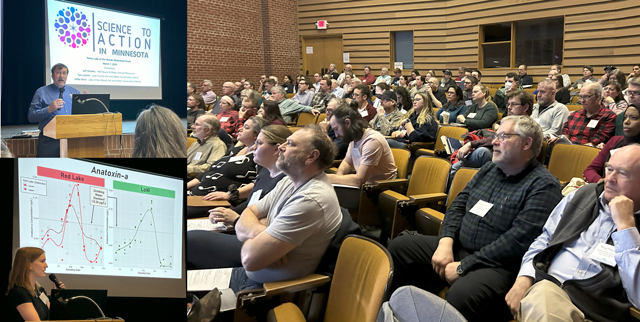 The Proceedings Report of the 2024 International Rainy-Lake of the Woods Watershed Forum is available for download at the Foundation’s website: lowwsf.com/forum-proceedings. Held March 6-7 in International Falls Minnesota, 142 researchers, resource managers, policy makers, and members of the public put Lake of the Woods and its watershed under the microscope.
The Proceedings Report of the 2024 International Rainy-Lake of the Woods Watershed Forum is available for download at the Foundation’s website: lowwsf.com/forum-proceedings. Held March 6-7 in International Falls Minnesota, 142 researchers, resource managers, policy makers, and members of the public put Lake of the Woods and its watershed under the microscope.
The report covers a wide range of subjects – Many of the 26 presentations this year focused on knowledge and tools that will inform management actions. This year’s Forum featured a moderated panel discussion "From Science to Action" that provided insights into the development of watershed restoration plans and implementation actions to meet phosphorus reduction goals. Presentations covered a wide range of disciplines grouped into themed sessions on:
- watershed governance
- ecosystem modeling
- contaminants and mining
- ecological interactions,
- nutrient dynamics as drivers of cyanobacteria and cyanotoxin production,
- nutrient and sediment load tracing, and
- updates on the major monitoring programs of the MPCA and ECCC.
Most presentations were recorded and are available for viewing for a limited time at lowwsf.com/watershed-forum.
Fred Desjarlait, spiritual advisor from Miskwaagamiiwi – Zaagaiganing (Red Lake Nation), joined by Métis Senator Karen Cederwall, helped open the Forum, with prayer and song honoring water, land and those who have come together to respect and protect it.
Terry Duguid, Parliamentary Secretary to the Prime Minister of Canada and Special Advisor on Water, provided a welcome address highlighting the importance of working together to protect our transboundary waters and Canada’s designation of Lake of the Woods as one of eight waters of national significance under the new Canada Water Agency. US Consul Marilyn Gayton delivered greetings from the US Consulate and on behalf of Ambassador Cohen, noting the Forum as a key opportunity to support a strong US–Canada relationship on our shared waters.
Participants reflected a broad range of interests and involvement in the watershed, representing 55 organizations, including local governments, soil and water conservation districts, provincial and state governments, federal governments, U.S. Tribes, Canadian First Nations, the International Joint Commission, industry, non-governmental organizations, universities, undergraduate and graduate students, and citizens interested in the future health of our watershed.
Please Please pdf download your copy of the report now(14.26 MB) .or go to the website to view any presentation recordings that are of interest to you.
